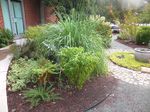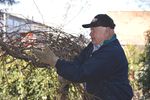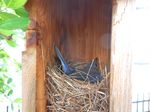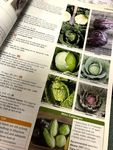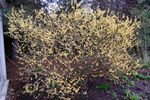Alamance Gardener - Alamance County Center
←
→
Page content transcription
If your browser does not render page correctly, please read the page content below
January 2018
Volume 9, Issue 1
Alamance Gardener
Alamance County Cooperative Extension Horticulture Department
Coming Events
Workshops and Demonstrations We’re At It Again!
Thurs., Feb. 8, 10:00a DEMO
Grapevine Pruning With Andy Zeman
Thurs., Feb 22, 10:00a
Homies and Honeys—Native Bees and a
Honey Bee Update
Thurs., Mar. 1, 10:00a DEMO*
Fruit Tree Pruning at Buster Sykes Farm*
Thurs., Mar. 8, 10:00a DEMO
Pruning Shrubs and Trees
Thurs., Mar. 22, 10:00a
Spring Birds-Watch your Windows!
Thurs., Apr. 5, 10:00a
Home Vegetable Gardening
Thurs., Apr. 19, 10:00a
The Herb Garden
*Fruit Tree pruning Demo will be at
Buster Sykes Demonstration Orchard,
2430 Turner Road, Mebane, NC.
Registration is required for all classes.
Click the image to
register online:
Contact us :
Alamance County Cooperative
Extension Service
209-C N. Graham Hopedale Rd.
Burlington, NC 27217
Phone: 336-570-6740
E-mail:
Mark Danieley A new year is here and that means it is time
Mark_danieley@ncsu.edu to start up our Think Green Thursdays
Chris Stecker gardening class series again. Our horticul-
Christine.stecker@alamance-nc.com ture advisory group, class participants and readers of this newsletter suggest the
Visit our website: class topics. When Chris and I first discussed offering these gardening classes, I
http://alamance.ces.ncsu.edu/ wondered how we would come up with enough topics to fill the year’s schedule.
The problem we have now is how to get all the classes we want to do in one year.
Like us on Face-
book, Click the We always try to add something new every year while many popular topics like
link below: pruning, vegetable gardening and lawn care are repeated. Adding new classes
means something else is left off. Some of the other regular classes like daylilies
and rain barrels may be offered every other year. It is a challenge trying to get
every class we want to present on the calendar. We have scheduled 19 TGT clas-
ses for 2018 that will consist of a variety of different subjects. A complete class
list for 2018 can be found on our website. http://alamance.ces.ncsu.edu/Alamance Gardener Volume 9, Issue 1 Page 2
Get A Refresher Or Learn Something New!
While Chris and I are good at what we do, we cannot be
experts in all horticulture related topics. In order to have
new and interesting subjects for our classes we need the help
of others. Our guest presenters make the wide variety of
class topics possible.
We start on February 8 with grapevine pruning. Andy
Zeman of Benjamin Vineyards has presented the class for
several years and will demonstrate proper pruning practices
after a classroom presentation. The February 22 class is on
native bees and honey bees and will be presented by Master
Gardener and beekeeper, Dr. Geoff Leister. This is an inter-
esting and important topic especially with the decline in the
honey bee population.
March 1 is fruit tree pruning with Dr. Mike Parker from NC State. This will be the
first class offered at our new Buster Sykes Farm demonstration orchard. March 8, I
will do a woody plant pruning demonstration in the Arbor Gate garden at the Ag
Building. Dr. Lynn Moseley, Master Gardener and local bird expert, will have a class
on spring birds on March 22, including information on protecting the birds and your
windows during mating season.
The April 5 class is on home vegetable
gardening. I will cover basic gardening
techniques with a focus on watering and
pest management. Continuing on the gar-
dening theme, Chris will present a class on
herb gardening April 19. While many herbs
are annuals, some can be perennial addi-
tions to the garden.
Warm season lawns is the topic for the
May 3 class. Tall fescue makes a nice
lawn in the spring and fall, but leaves a
little something to be desired in the
summer. If you want a nice green lawn
in the summer, a warm season lawn is
the answer.
Master Gardener Sharon Yarbrough will present
a class on carnivorous plants on May 17. Carniv-
orous plants are unique plants that capture prey
(primarily insects) in order to obtain nutrients
because they tend to live in soils that have little to no nutrients in them.
Eleanor Frederick, our Family and Consumer Sciences agent, will present the June 7 class on ver-
micomposting. Vermicomposting is a great way to compost food waste in your home all year long.
Chris leads the June 21 class on woody ornamental propagation. This class will give you the oppor-
tunity to collect cuttings from the Arbor Gate garden to try to root on your own.
This is just the beginning! There are 19 classes in all from February 8th through
October 25th. Click the image for a complete listing with links to register:
If you have any questions about our Think Green Thursdays classes or any other gardening topic, give Chris or me a call.Alamance Gardener Volume 9, Issue 1 Page 3
January Garden Tips
R eview your garden
from last year and
lay out this year’s garden
G roup clean, insect-
free houseplants to-
gether to increase humidity
S ow seeds of cool-
weather vegetables
(broccoli, cabbage, cauli-
design. Order plants and during these dry winter flower, collards, lettuce,
seeds, keeping an eye to- months. Mist the group onions and spinach) in
ward crop rotation to help periodically to further en- containers for transplant-
prevent disease. hance air moisture. ing into the garden in
March. Outdoors, sow
H ouseplants don’t
require much water I f your houseplants are
on a windowsill, keep
the leaves away from the
edible-pod peas and gar-
den peas beginning this
month. Continue to plant
or fertilizer this time of
year, but attention must be glass, especially when the asparagus.
paid! Use a damp cloth to weather is very cold. The
glass will conduct the cold
O
wipe dust from plants that n a mild day (above
have smooth leaves. Use a and may burn tender
leaves. Draw the drapes or 55 degrees) you can
soft-bristled brush to clean spot treat winter annual
the hairy leaves of African shades at night for more
protection. weeds, including wild on-
violets and gloxinia. Water ions and garlic. These slip-
only when soil feels dry,
then take the plant to a
sink and water thoroughly, C heck the condition of pery-leaved stinkers will
stored bulbs and tu- require the addition of a
bers of dahlias, tuberous spreader sticker to your
allowing excess to drain mix to help the chemical
completely before replac- begonias, caladiums and
callas. Bulbs stored in adhere to the leaves. As
ing the plant on its saucer. for the henbit, deadnettle
warm, humid conditions
are prone to rot. Discard and chickweed, consider
U se a magnifying glass any bulbs that feel soft or leaving them for the bees.
to inspect both sides rotten.
of leaves of your house-
On a mild day, honey bees
will venture out to forage,
W
plants. Look for signs of hen the weather and winter “weeds” are on
insects. Sticky residue may turns frigid, re- their menu.
indicate the presence of member the wildlife.
mealy bugs or soft scale.
T
Fresh, free-flowing water oward the end of this
Small, fine webs may indi- is essential to all animals,
cate spider mite infesta- month, apply a
so keep birdbaths ice-free dormant horticultural oil
tion. Call the Alamance and filled up. You might to roses. Do this before
County Cooperative Ex- consider a heated birdbath bud-break to smother
tension for information on for a worry-free way to
the treatment of insect over-wintering insects and
serve up fresh water to their eggs. Read the label
problems on houseplants. winter visitors.
carefully for instructions
on use.Alamance Gardener Volume 9, Issue 1 Page 4 Arbor Gate Plant of the Month Fragrant Wintersweet Chimonanthus praecox So, it’s winter in the garden. Brilliant fall colors have faded to shades of taupe and brown and even the most ardent gardeners have retreated to their firesides to dream about spring. But, there is beauty to be found in the winter garden! Witness the beautiful flaking bark of oak leaf hydrangea, the fanciful curled flower heads of Maidengrass, a brilliant red berry shining among the spiny cladophylls of Butcher’s Broom. And, yes! There are flowers! If you’re looking for a real early bloomer, look for plants with the word “praecox” in the name. Praecox means “very early”, and, in the case of Fragrant Wintersweet, that means January! The secret to enjoying a fra- grant winter bloomer is to plant it near a walkway or entrance, so that it can be en- joyed even when passersby are merely scurrying from one indoor spot to another. Fragrant Wintersweet is a deciduous shrub that typically grows 10-15’ tall and to 8-12’ wide. It does best in well-drained soil in full sun to part shade. Given a bit of protection from winter’s worst, the sweetly fragrant flowers will persist into February. Prune after flowering, as flowers are formed on old wood. Seed will germinate readily if collected and planted just as the receptacles are changing from green to brown (May-June). Plants may take between five and ten years to bloom from seed. Read more here: https://plants.ces.ncsu.edu/plants/all/chimonanthus-praecox/
You can also read




